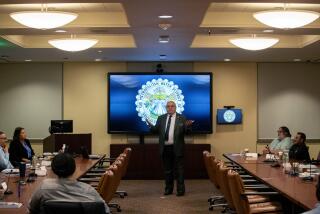Water Officials Told to Report Past Gifts : Utilities: The order to Santa Margarita district’s top employees follows revelation of gratuities received from chief outside engineering firm.
MISSION VIEJO — Top employees of the Santa Margarita Water District were ordered Monday to amend their statements of economic interest dating back a decade or more to include any free meals and gifts they failed to report receiving from those doing business with the district.
General Manager John J. Schatz said he ordered the action Monday after The Times reported that the district’s two top engineers were treated to hundreds of meals and gifts valued at nearly $12,000 by the district’s chief outside engineering firm between 1989 and 1992.
The Irvine-based engineering firm of Robert Bein, William Frost & Associates provided the gifts--including stays in resort towns--to Bill Dye, the district’s top engineer, and his assistant, Dan Ferons, during a four-year period in which the company was awarded nearly $12 million in contracts that were not competitively bid.
Dye, 58, has never reported receiving anything of value from any contractor on the statements of economic interest he has been required to file every year under state conflict-of-interest laws.
Ferons, 34, has not been required to file statements of economic interest and was under no obligation to refrain from using his influence on Bein-Frost’s behalf.
The state’s Political Reform Act of 1974 makes it illegal, however, for certain “designated officials” who receive gifts worth more than $250 in any one year to use their influence to steer any business to the gift-giver in the succeeding 12 months.
Bein-Frost’s spending on Dye, who has been one of the district’s designated officials since 1979, surpassed that amount in each of the four years, yet Dye continued to recommend and vote on Bein-Frost contracts in apparent violation of the reform act.
In a press release issued late Monday, Schatz defended the two men, saying they had been “following the rules as they understood them prior to last year,” when the district became embroiled in a scandal involving lavish spending of district funds by its two top managers, and their acceptance of at least $60,000 in gifts from engineering firms and other contractors they had recommended for lucrative district work.
“Prior to last year, Bill (Dye) and other employees simply were not aware . . . that meals provided during working sessions with the district’s engineers were reportable gifts,” Schatz said, tacitly acknowledging that the gifts should have been reported.
He said Dye and other employees who file statements of economic interest, including the district’s chief financial officer, operations manager and controller, are now being asked to retroactively review the total dollar amount of meals they were provided by vendors, and to amend their statements of economic interest.
Schatz did not address reporting of anything other than meals, although Ferons received an all-expenses-paid trip to Orlando, Fla., from Bein-Frost, and Dye was treated to a stay in a Monterey hotel.
Schatz said he found no evidence to suggest that Dye and Ferons “ever received anything from vendors in exchange for recommendations to hire those vendors. . . .”
Schatz skirted the issue of whether Dye violated state law by voting to recommend contracts to a firm from which he had accepted gifts in excess of state limits.
In all, Dye received more than $5,000 from Bein-Frost between 1989 and 1992 and would have been prohibited from voting on any contract involving Bein-Frost for the years 1990, 1991, 1992 and 1993.
Despite Schatz’s praise for Dye’s and Ferons’ “continued valuable contributions” to the district, one board member pledged to investigate their actions further and said nothing had been decided about either engineer.
“I want to know the details and I want to know them now,” said board member Bob Lay. “I intend to have a very serious chat with Mr. Dye and Mr. Ferons and ask them, very firmly, what was going on. This is not going to be swept under the rug.”
Lay, one of three new board members elected in November after last spring’s scandal, said he was disturbed by the disclosures and planned to raise them at Friday’s engineering committee meeting.
“I need to do some investigating and I’m not sure how to start,” Lay said.
Because Ferons was not among those lower-level employees designated by the district to comply with the state law, he did not have to report the Bein-Frost gifts, which totaled more than $6,000 between 1989 and 1992. But Schatz said Ferons will be among a number of “second-tier” department supervisors who now will be required to file interest statements.
Dye has steadfastly refused comment on the matter. Ferons has referred all inquiries to Schatz.
Dye appears to be in a similar situation as his former bosses, ex-general manager Walter W. (Bill) Knitz and his onetime assistant, Michael P. Lord, who accepted thousands of dollars in entertainment and gifts from Bein-Frost and other companies they recommended for contracts.
Both Knitz and Lord are under investigation by the district attorney’s office and the FBI for possible conflict-of-interest law violations. Both took early retirement last May after the scandal broke.
Soon thereafter, Dye and other district employees were made aware, during a legal seminar sponsored by the district, that they were required to report such gifts.
At the time, Dye challenged the need for him to file statements of economic interest because state guidelines called for the “district engineer” to file, while his title is “chief engineer.”
In his press release, Schatz said that, “unfortunately, even following last year’s events, Bill did not receive clear direction that prior years’ statements could or should be amended.”
More to Read
Sign up for Essential California
The most important California stories and recommendations in your inbox every morning.
You may occasionally receive promotional content from the Los Angeles Times.









